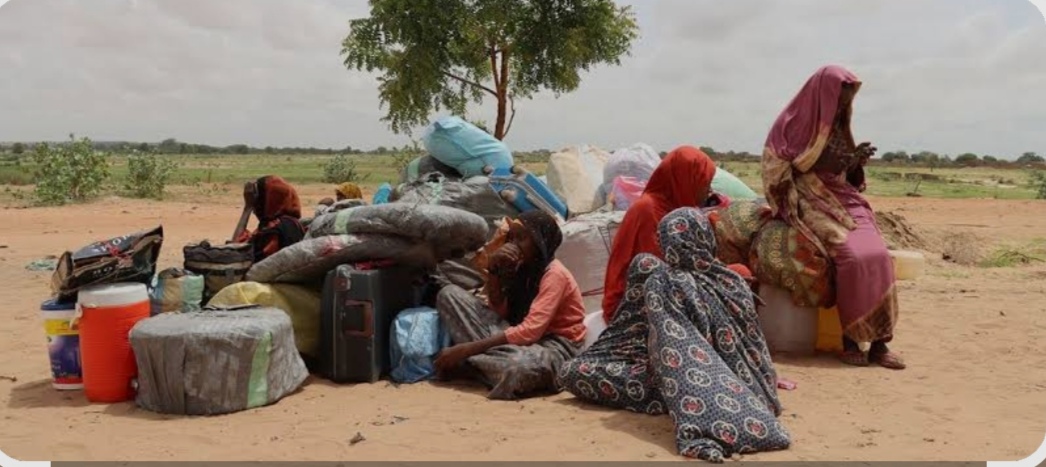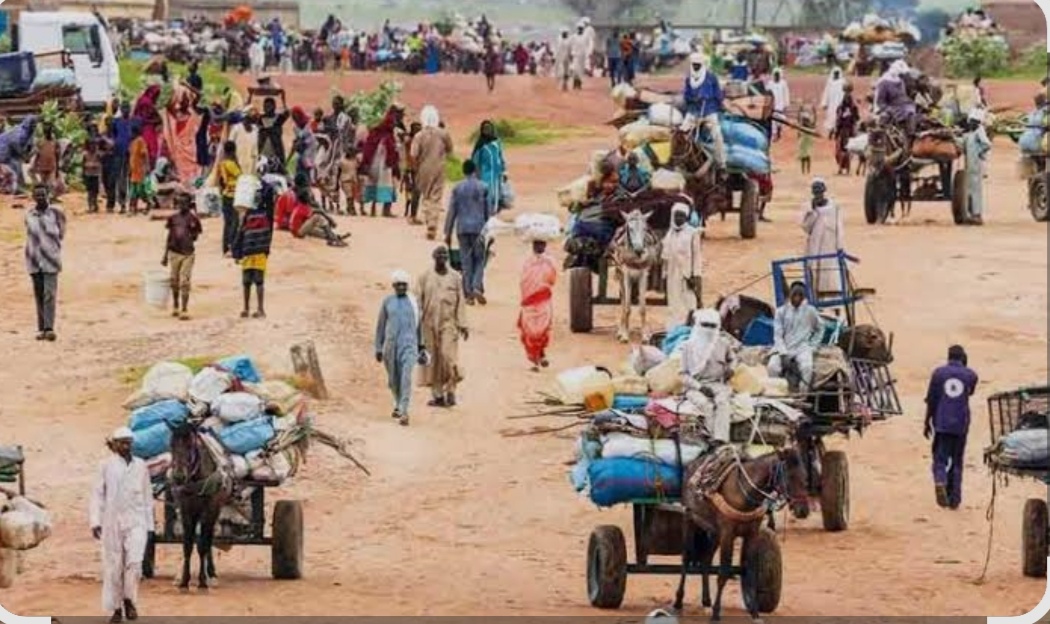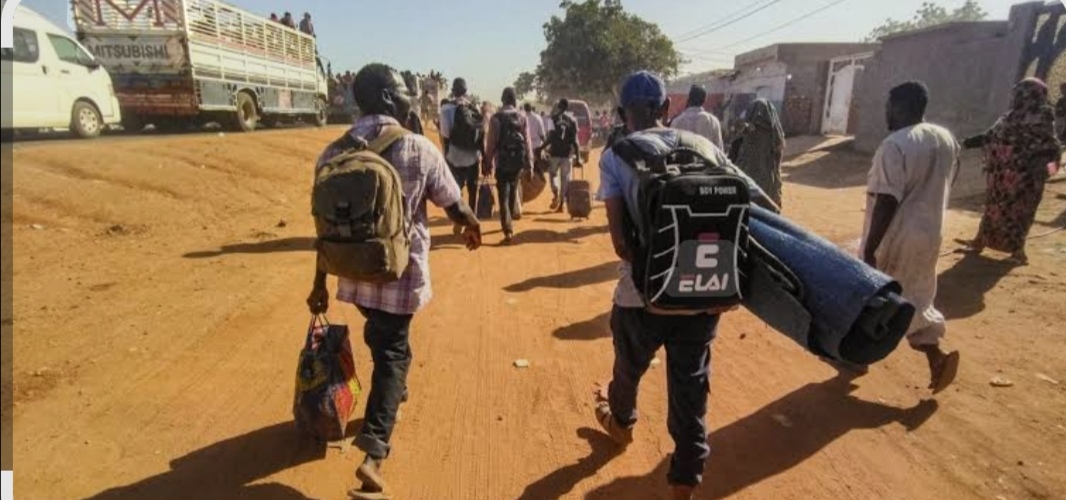Al-Salha: A Displacement Story from the Last Thursday
28 September, 2025
Portsudan, (Sudanow)_ Most residents of Al-Salha area, south of Omdurman, endured two years of war in their homes. After some people fled, their homes were plundered and emptied of their contents in a gradual process of looting that began with luxury cars, then lowered its standards little by little to a degree no one could have imagined. For some, the decision to flee was a difficult choice as they watched the homes of those who had left being stripped of everything except memories.
Al-Sunni KaramAllah, a young man in his twenties, and his family found themselves with only one option: to leave Al-Salha for medical treatment. His father had been shot in his left leg by a malicious militiaman, and his uncle had a bullet pierce the roof of their house and lodge in his chest while he was with his brother. The bullet remains in his chest to this day, as surgery was impossible due to his deteriorating health. However, leaving Al-Salha required arrangements, especially after Al-Salha massacre, which claimed the lives of a large number of young people who were on their way out of the area.
The village of Al-Aamra, located west of Al-Salha, is the starting point for the displacement journey from Al-Salha to northern Omdurman. It is where the last stories of looting from the militia, which camped there to rob citizens of their money, phones, and belongings in their final moments, come to an end. After Al-Aamra village is the village of Umm Barouka, then Al-Kou’, which is a safe area that the militia cannot reach for fear of the army's presence. However, the sound of army snipers' bullets could be heard in the air above Al-Aamra as they tried to hunt down militiamen. In this atmosphere, Al-Sunni's family left Al-Salha four days before the army's entry, by a vehicle driven by heavily armed members of the Rapid Support Militia toward Al-Aamra for a fee. This was a common practice for the militia: to take citizens out for a fee to save them from looting. Al-Aamra is the last station for the militants, and from there, the search for another means to complete the displacement to northern Omdurman begins.

Al-Sunni says they found two carts (a primitive means of transport pulled by animals), and before they could lift their luggage, a motorcycle carrying three masked gunmen appeared. "This is when the real moments of terror began," Al-Sunni recalled. "My family consisted of my father, who was injured in his leg, my uncle, who was injured in his chest, my mother and my sister, who was expecting a baby, in addition to my three younger siblings, an elderly woman, and two young men from the neighborhood. How could we face this situation?" Al-Sunni continued his story, "At that time, the sound of army snipers' bullets was clearly passing over our heads, targeting the masked gunmen. I realized then that we were in the army's line of sight as they tried to snipe these gunmen while trying to avoid hitting us."
The gunmen ordered the convoy to turn back. Its members, except for the injured and the women, were forced into one of the empty houses in Al-Aamra, which was opened by gunfire. After a process of terrorizing the small convoy, their phones and money were taken, and a search for gold began. The women were threatened; even the elderly woman was not spared from the threats or the looting. What money she had was taken, and the convoy was left with no money to help them on their journey. Al-Sunni described these moments as a nightmare. "These people have not a shred of mercy in their hearts," he said. "Despite the circumstances the convoy members were living in, their hearts didn't soften. They acted with extreme rudeness." Al-Sunni confirmed he saw them swallowing narcotic pills and realized they were at the mercy of unconscious people. Despite the women's crying and the children's panic, they took the money and phones and went to another house where a group of women were hiding on their way out of Al-Aamra. The same young man who had hidden them betrayed them, waving to the gunmen from the top of the house. The gunmen fired shots into the air to spread more terror and to anticipate any potential resistance. That young man's features indicated he was from the area, but it was treason, as Al-Sunni said.
The leader of the first vehicle (Muhammad) spoke up, saying, "We saw and lived through what happened to you, and we are ready to take you to your destination, and we will not argue with you there." After sunset, the journey began westward, with everyone looking forward to getting away from danger, as Al-Sunni recalled. The convoy entered Umm Barouka, then Al-Kou', all villages located in the southwestern part of Omdurman. They got water from one of the scattered houses in that area and deepened their direction westward, then stopped for a light dinner consisting of pasta and vermicelli prepared by the two convoy leaders with astonishing speed in a single pot, which was all they had and was also used to water the animals.

In the dead of night, the convoy continued and penetrated the west of Omdurman. Al-Sunni said, "We walked until I thought we had reached the state of North Kordofan. Around midnight, the direction began to change little by little toward the north. By then, the moon had shone, and the vision of the road's surroundings became clearer, which the two convoy leaders, Muhammad and Babaker, knew well." Al-Sunni expressed in a low voice the desolation of the road in the far west of Omdurman heading north and showed deep sadness for the state of his family members as they faced horrors they had no strength for, pointing to the fear that had taken over them, which motivated him to spread some reassurance with the help of one of the young men in the convoy. What happened in Al-Aamra will not be forgotten. The reassurances that Muhammad and Babaker occasionally offered also had an effect: "You are safe now."
The convoy traveled throughout the night of the last Thursday before the army entered Al-Salha. At 4:00 a.m. on Friday, the direction began to change toward the east, and a distant light appeared. Al-Sunni realized they were on the outskirts of northern Omdurman, but they and the animals were exhausted. They dismounted and lay on the ground, sleeping for two hours. When the sun rose, the convoy moved eastward after having morning tea from the same (shared) pot, which forced humans and animals to share in the tools of survival under the war's circumstances. Al-Sunni spoke about the length and desolation of the road and the diversity of its environment: "At one time, we passed through dark, green farms; at another, through a barren desert, where we would get down to help the animals get through the sand; and at another, through a landscape that I don't know how to describe."
"Do you see that distant building? This is the destination," Babaker said after the direction changed to the southeast. The elderly woman woke up from her sleep, which had accompanied her throughout the displacement, and asked loudly, "Where? Where?" Tears poured from her eyes, and a wave of joy swept over the convoy members. The feeling of safety was a taste the people of Al-Salha had not had since the war began—two years of the militia spread throughout all parts of it, looting, killing, and terrorizing. Finally, a new hope appeared. At 1:00 p.m., Al-Sunni says, "We entered 'Hillat Musa,' located in the far northwest of Omdurman. We saw the yellow Khartoum taxi after two years, and cars driven by ordinary citizens, not masked men or kaddamoulate. We saw the Northern Arterial Road and long-distance buses. We saw people performing Friday prayers in a public square. These sights seemed strange to us. We spent 22 hours walking from the far south of Omdurman to its far north by cart."
"There is Balla's shop, which we've heard about," he said. This is where the displaced people from Al-Saliha make calls to their families ("Catch up with us, we've reached northern Omdurman, and everything we had was looted"). Muhammad and Babaker, the convoy leaders, knew everything, and that's why they didn't worry about their payment. Balla's shop was the solution.

"My father died during the operation, three days after we entered Al-Thawra area," Al-Sunni concluded his displacement story to Sudanow. "It was decided to perform the operation for my father in one of the hospitals, and as a result of a severe hemorrhage during it, he passed away. As for my uncle, the doctors refused to perform his operation and remove the bullet from his chest due to his deteriorating health and his body's lack of the necessary immunity. The bullet has been in his chest for six months now."







